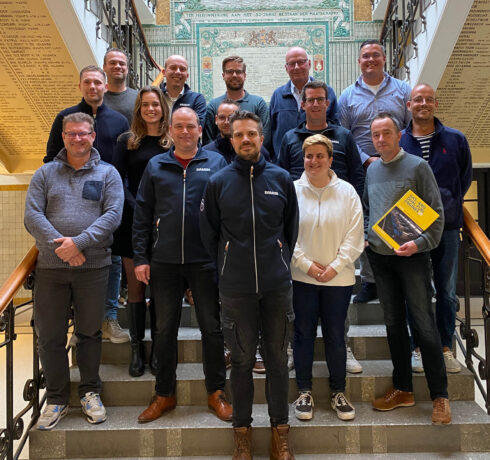The Damen Schelde Marine Services (DSMS) team topped off 2023 with its fourth technical training session of the year, with the whole team taking part in a training specialising in diesel and gas engines given by Kees Kuiken. “In the world of marine propulsion education, the name Kees Kuiken is well known,” states Arnold Suykerbuyk, Managing Director of DSMS. “Besides running a training company, Kees is also the author of a number of educational books.”
It was because of Kees’ decades of knowledge that DSMS decided to invite him to give a two-day training course diving deep into the world of diesel, gas, and dual-fuel engines. “The first day was theoretical explanation and clarifications, history, the differences between four stroke and two-stroke engines, parts recognition, and how different engines work with different fuels,” says Remy Quist, DSMS Sales and Marketing Manager. “The second day was more like a workshop where we could talk about some of the customer-specific issues that we encounter when we are dealing directly with clients. We get a lot of questions from our clients’ technical teams – this second day proposed solutions on how we can assist our clients better. Partnering with them to help their engines run more smoothly.”
 One of the books by Kees Kuiken.
One of the books by Kees Kuiken.
For DSMS, the maritime sector’s transition away from traditional heavy fuel oil towards new, cleaner alternatives raises various issues. These were discussed in the training course. “For example, the implementation of low sulphur fuels has had big implications on our clients’ engine maintenance routines; after all, the sulphur in the older fuels acted as a lubricant,” Jeroen Caris, Commercial Manager at DSMS, says. “And looking at gas engines, while they are not as dirty as marine diesel engines, they do produce a lot more internal heat, which is something that we need to keep in mind in terms of maintenance.”
The training programme also included a closer look at alternative fuels. Remy: “We discussed the pros and cons of new fuels such as LNG, LPG, ammonia, methanol, and ethanol – and what we can expect from a maintenance point of view. However, most of these fuels are still in their early days; of all the ships sailing today, there are only a few hundred that are sailing on LNG or LPG.”
All in all, fifteen of the DSMS team took part in the training. “This included both new and ‘old’ members of the team,” Jeroen says. “As an engine parts supplier, it is important for all of us to keep our knowledge of our core business as up-to-date as possible. This is precisely why we organise training sessions like this, each time with a different speaker or subject matter, to learn more about the complex and ever-changing issue of maritime propulsion.”
 DSMS participated in a two-day training course diving deep into the world of diesel, gas, and dual-fuel engines.
DSMS participated in a two-day training course diving deep into the world of diesel, gas, and dual-fuel engines.

